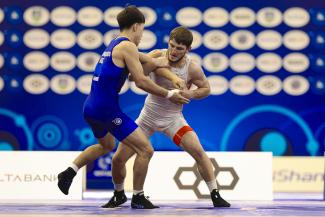Seven Statement Wins from #WrestleIstanbul
Thursday, March 3, 2022 - 13:42 By Eric Olanowski

ISTANBUL, Turkey (March 2) -- The first Ranking Series event of the season just wrapped up in Istanbul and there were loads of unexpected upsets. We laid out seven statement wins from Turkey that wrestling fans have to see.
No. 7: Chance MARSTELLER (USA) df. Hetik CABOLOV (SRB), 10-5
Coming into the Yasar Dogu, Marsteller's only senior-level appearance came at the '19 Alexander Medved, where he finished in ninth place.
In Istanbul, Marsteller showed significant improvement en route to the 79kg finals where he fell to Olympic champion Jordan BURROUGHS (USA) in the finals. Of the American's four wins, his most significant hand-raising performance came in 1/8 finals when he outclassed Serbia's former world champ Hetik Cabolov, 10-5.
No. 6: Mohammadbagher YAKHKESHI (IRI) over Suleyman ATLI (TUR),7-5
Yakhkeshi sent two-time world medalist Atli packing early after he scored arguably the most memorable last-second win from Istanbul.
Yakhkeshi trailed 5-1 with under a minute to go but continued to attack as his Turkish opponenet put the match in cruise control. The Iranian picked up a takedown near the 45-second mark and closed cut Atli's lead to 5-3. With less than 10 seconds left, Yakhkeshi jacked up an underhook on the Tokyo Olympian and tossed him to his back for four points with a perfectly timed hip toss, stealing a spot in the 61kg semifinals.
No. 5: Islam ABBASOV (AZE) df. Zurabi DATUNASHVILI (SRB), 8-4
Abbasov came into Instanbul needing a signature win that would get him back on the winning course. He was coming off abysmal performances at the Olympic Games and World Championships, where he finished in 13th and 25th place, respectively.
Abbasov earned that trajectory-changing win after he defeated defending world champ and Tokyo Olympic bronze medalist Zatunashvili to win the 87kg Ranking Series title.
No. 4: Tserenchimed SUKHEE (MGL) df. Taybe YUSEIN (BUL), via fall
It seems that '14 world champion Sukhee has put the disappointment of missing the Tokyo Olympic Games behind her. That was evident in Istanbul, as she reached the top of the podium with a trio of wins over Olympic bronzes medalist Sakshi MALIK (IND), Marwa AMRI (TUN) and Taybe YUSEIN (BUL).
Without a doubt, Sukhee's biggest win came in the 1/8 final when she pinned world champion and Tokyo bronze medalist Yusein. The Mongolian led the match by one point but kept her foot on the gas. She dumped the Bulgarian to her back and scored the fall, punching her ticket to the quarterfinals before ultimately winning her second gold medal of the year (Ivan Yariguin in January).
No. 3: Islomjon BAKHRAMOV (UZB) df. Victor CIOBANU (MDA), 8-0
From a team standpoint, Uzbekistan's Greco-Roman squad had one of the hottest showings in Turkey. They were led by newly-retired Olympic bronze medalist Elmurat TASMURADOV (UZB), who cornered Islomjon BAKHRAMOV (UZB), Mahmud BAKHSHILLOEV (UZB) and Rustam ASSAKALOV (UZB) to gold-medal victories.
Without a doubt, the most impressive run of the three came at 63kg, where Bakhramov breezed past reigning world champion Victor CIOBANU (MDA), 9-0, in the finals.
No. 2: Beka KANDELAKI (AZE) df. Riza KAYAALP (TUR), via fall
In jaw-dropped fashion, Kandelaki not only picked up one of the biggest upsets of the competition, but his Istanbul win will go down as one of the biggest upsets of the season.
Kandelaki hand fought hard in the first against Turkey's modern-day legend Riza Kayaalp but was placed in the par terre position after being hit with passivity. After surrendering the inactivity point, the Azeri conceded a gut wrench and trailed 3-0, before doing the unthinkable. He halted a second gut-wrench from the four-time world champion and planted the Turkish great on his back for the fall. He ended Kayaalp's hopes of winning an eighth Vehbi Emre & Hamit Kaplan Tournament gold medal and reached the finals of an international competition for the first time since 2016.
No. 1: Lais NUNES DE OLIVEIRA (BRA) df. Aisuluu TYNYBEKOVA (KGZ), 8-0
Nunes De Oliveira took her wrestling to another level in the 1/8 finals against two-time world champion Aisuluu TYNYBEKOVA (KGZ). Whatever her game plan was, it worked to a tee. The Brazilian wrestled a perfect bout against the Tokyo Olympic silver medalist, scoring a pair of stepouts and three takedowns, blanking the Kyrgyz star, 8-0.


Share your thoughts.
Comments